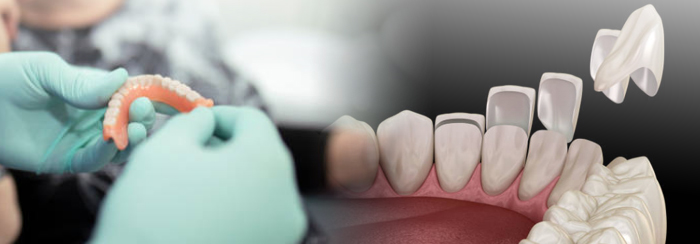Comparing the Differences Between Dentures and Veneers
Here’s what to know before your cosmetic veneers or tooth dentures consultation

If it’s time for a cosmetic and/or restorative dental procedure to get your smile back on track to confidence, there are two treatment options that have been a great success for patients for many years: dentures, and porcelain veneers.
Because these two procedures vary greatly, we’re here to outline the defining differences to help steer you in the right direction. So without further ado, here’s what you should know about dentures and veneers.
What are dentures?
There are three types of dentures: full dentures, which are removable sets of prosthetic replacement teeth and gums for the entire mouth, partial dentures, which are removable retainers designed to restore smiles with only several and not all teeth missing, and lastly, permanent dentures, which are replacement teeth and gums screwed directly into the jaw bone for a restoration that is fixed and not removable.
What are veneers?
With the highest quality veneers made of porcelain, cosmetic dental veneers are waver-thin shells that are customized and shaped to adhere to the surfaces of the teeth in order to mask imperfections and correct any instances of discolouration, spacing/gaps, or irregular size/shape. This treatment is capable of completely transforming a smile into one that is truly stunning and capable of turning heads.
Comparing the procedures
Dentures: For full and partial dentures, the procedure will involve potentially removing any remaining teeth for preparation. After this, the dentist will create molds of the mouth to be used in the creation of your custom dentures in a lab. This entire process can take several months and visits.
For permanent dentures, the process can take as long as three to six months to complete, due to the surgical implantation component, and the months of healing involved.
Veneers: The process for porcelain veneers is far less time-consuming than the process for dentures, typically taking less than a month. The process involves first coming in for a consultation where your cosmetic goals will be discussed, and a treatment plan will be organized.
Next, your teeth will need to be prepared for the veneers through the removal of small amounts of tooth enamel, which will allow the teeth to accommodate placement of the veneers’ thin shells. Impressions will then be taken of the prepared teeth which will be sent to a dental lab for the custom creation of your veneers, and you’ll be fitted with temporary veneers in the meantime.
In the next visit, the veneers will be permanently bonded to the teeth’s surfaces, and further shaped and adjusted to ensure a seamless and beautiful result.
Now, let’s go over some noteworthy pros and cons of each procedure:
On average, dentures have a longer lifespan than most veneer treatments (in many cases easily lasting longer than 20 years), and are much less likely to chip compared to veneers.
However, permanent dentures can be painful, particularly during the surgical installation process - and patients will need to deal with adhesives if they receive non-permanent dentures. Veneers at no point should be painful.
Veneers make an excellent cosmetic option for patients with healthy natural teeth still present. However, they are generally more expensive than dentures - with porcelain veneers costing roughly $2000 per tooth (consider that multiple front teeth will typically require treatment), while complete dentures range from around $2500 to $2600, with partial dentures costing anywhere from around $600 to $2200 depending on the preparation work involved.
Fortunately, both treatments provide beautiful and natural-looking cosmetic results - so there are no shortcomings there.
Ready to schedule your dentures or veneers consultation?
A preferred provider dentist of a Teeth First Dental Network clinic in Ontario would be pleased to assist you!
Contact a Teeth First Dental clinic near you today to learn more, or to schedule your consultation.